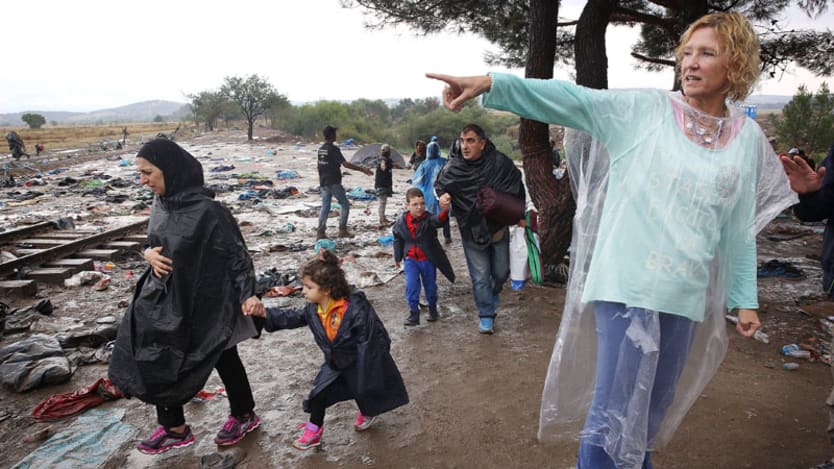
EDITOR’S NOTE: This article was previously published in One World, a Dutch news outlet, on September 9, 2015. You can read the original article here.
Lesbos is a reflection of the total collapse of Europe’s refugee policy in miniature. The island is bursting at the seams. There is a massive influx of people from Syria, Afghanistan and other flashpoints of conflict. Europe and the United Nations lack the necessary determination and resources. The result is chaos and new trauma for people who were already traumatized.
This past week, I have visited the island of Lesbos with other Cordaid relief workers and Caritas Greece. Every day, 2,000 to 4,000 refugees and migrants arrive here. Just on Lesbos. Life jackets have colored the beach orange.
Syrians usually get the papers they need to travel on to Athens quickly. But the rest have to wait. And it’s a long wait. They have little or nothing. No toilets, no roof over their heads, no organized relief or registration. And no security. Frustrated Afghans clash with Syrians. Others attack the police. Ferries are stormed and ports are blocked. Around 25,000 refugees are stuck here — that is an additional 30 percent to the total population of 85,000.
The capital Mytilene is teeming with refugees, on the sidewalks, in parks, in the streets. These men, women and children have often narrowly escaped hardship that we can’t even imagine. They’ve been on the move for months, having fought for a place on a boat. And now they’re waiting again, spending their nights on cardboard among garbage, braving the fearful and angry looks of a Greek population that’s seeing their island deteriorate by the day.
We’re doing our best to distribute mattresses and sleeping bags — in fact under police surveillance — at one of the island’s two shelters for refugees. We’re providing the same kind of assistance to refugees in Chios, in Athens, at the Greek-Macedonian border, and in Serbia. And we’re doing the same in northern Iraq, where millions of Kurds and Yazidis are on the run, and in South Sudan and the Democratic Republic of the Congo.
In the meantime, a lack of funds has forced the United Nations to cut its food aid to millions of refugees in Lebanon and Jordan. It’s not surprising that the number of refugees is growing every day. European countries, including the Netherlands, are bickering about whether to provide shelter to thousands of asylum seekers and help solve a problem that’s threatening world peace. The Dutch are considering sheltering a mere 7,000 … Lesbos alone accommodates three times that number.
The biggest refugee crisis since World War II requires more determination, greater vision and more solidarity. Ninety-seven percent of these refugees are currently being given shelter close to the flashpoints of conflict: in Lebanon, Jordan and northern Iraq.
Please, Europe: support these countries. Do everything you can politically to tackle the causes of conflict and exclusion. Be realistic and humane in your reception policy. Be generous and uniform in your accommodation of refugees. Help them to find work and send their children to school. Enrich yourself with their knowledge, their experience and their amply tested strength. Don’t drive them crazy and make them totally dependent with years of red tape that costs loads of money to boot. And don’t cut development budgets in order to receive asylum seekers.
Because that money is sorely needed to do what relief organizations have been doing for years with increasingly meager resources: providing relief in the region, and working towards peace, security and development.
From Lesbos we’ll be travelling on to the Greek-Macedonian border to distribute food parcels to around 2,000 stranded refugees. A drop in the ocean? No. Much-needed solidarity.
Conflict in Context is a monthlong global conversation on conflict, transition and recovery hosted by Devex in partnership with Chemonics, Cordaid, Mercy Corps , OSCE and USAID. We’ll decode the challenges and highlight the opportunities countries face while in crisis and what the development community is doing to respond. Visit the campaign site and join the conversation using #ConflictinContext.
